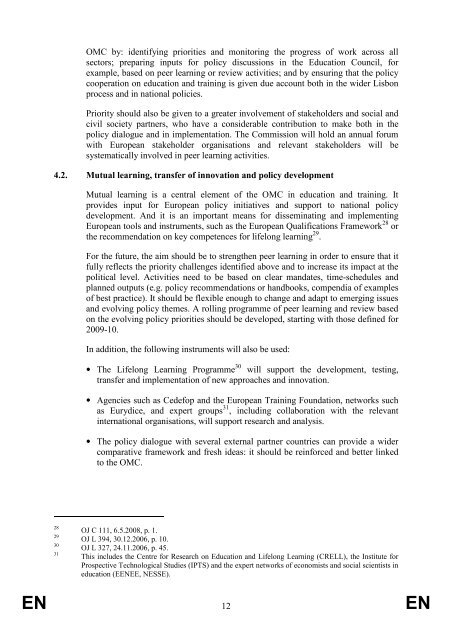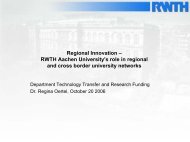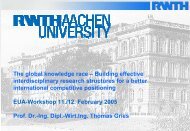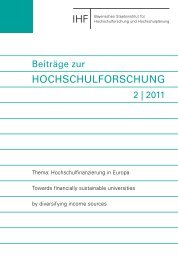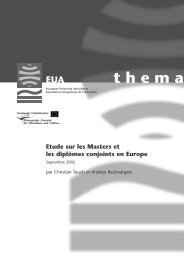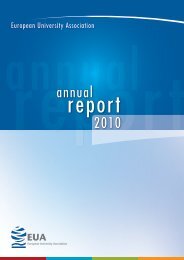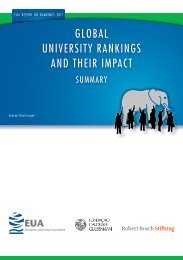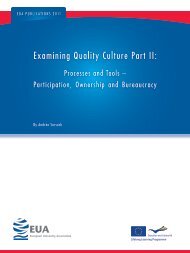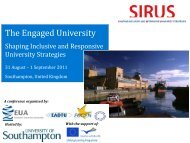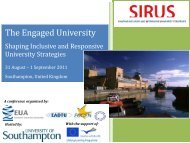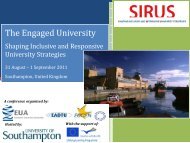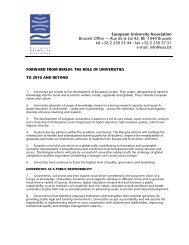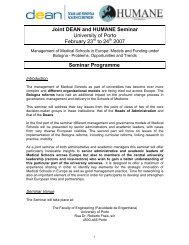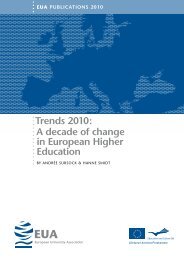17535/08 - European University Association
17535/08 - European University Association
17535/08 - European University Association
Create successful ePaper yourself
Turn your PDF publications into a flip-book with our unique Google optimized e-Paper software.
OMC by: identifying priorities and monitoring the progress of work across all<br />
sectors; preparing inputs for policy discussions in the Education Council, for<br />
example, based on peer learning or review activities; and by ensuring that the policy<br />
cooperation on education and training is given due account both in the wider Lisbon<br />
process and in national policies.<br />
Priority should also be given to a greater involvement of stakeholders and social and<br />
civil society partners, who have a considerable contribution to make both in the<br />
policy dialogue and in implementation. The Commission will hold an annual forum<br />
with <strong>European</strong> stakeholder organisations and relevant stakeholders will be<br />
systematically involved in peer learning activities.<br />
4.2. Mutual learning, transfer of innovation and policy development<br />
Mutual learning is a central element of the OMC in education and training. It<br />
provides input for <strong>European</strong> policy initiatives and support to national policy<br />
development. And it is an important means for disseminating and implementing<br />
<strong>European</strong> tools and instruments, such as the <strong>European</strong> Qualifications Framework 28 or<br />
the recommendation on key competences for lifelong learning 29 .<br />
For the future, the aim should be to strengthen peer learning in order to ensure that it<br />
fully reflects the priority challenges identified above and to increase its impact at the<br />
political level. Activities need to be based on clear mandates, time-schedules and<br />
planned outputs (e.g. policy recommendations or handbooks, compendia of examples<br />
of best practice). It should be flexible enough to change and adapt to emerging issues<br />
and evolving policy themes. A rolling programme of peer learning and review based<br />
on the evolving policy priorities should be developed, starting with those defined for<br />
2009-10.<br />
In addition, the following instruments will also be used:<br />
• The Lifelong Learning Programme 30 will support the development, testing,<br />
transfer and implementation of new approaches and innovation.<br />
• Agencies such as Cedefop and the <strong>European</strong> Training Foundation, networks such<br />
as Eurydice, and expert groups 31 , including collaboration with the relevant<br />
international organisations, will support research and analysis.<br />
• The policy dialogue with several external partner countries can provide a wider<br />
comparative framework and fresh ideas: it should be reinforced and better linked<br />
to the OMC.<br />
28 OJ C 111, 6.5.20<strong>08</strong>, p. 1.<br />
29 OJ L 394, 30.12.2006, p. 10.<br />
30 OJ L 327, 24.11.2006, p. 45.<br />
31 This includes the Centre for Research on Education and Lifelong Learning (CRELL), the Institute for<br />
Prospective Technological Studies (IPTS) and the expert networks of economists and social scientists in<br />
education (EENEE, NESSE).<br />
EN 12 EN


